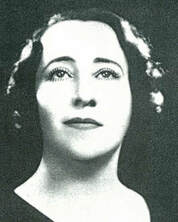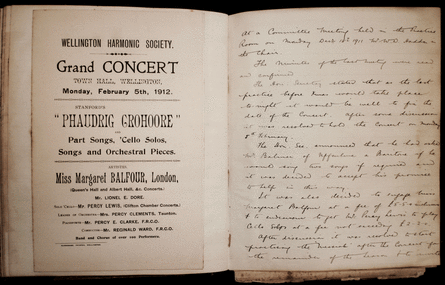SERENADE TO MUSIC
A portrait of Margaret Balfour (1889-1961)
|
Serenade to Music, which was performed at the Last Night of the Proms in 2016, was composed by Ralph Vaughan Williams to mark the 50th anniversary of Sir Henry Wood’s first concert and the solo parts were specifically written for each of the sixteen eminent soloists, amongst them the contralto, Margaret Balfour.
|
Margaret Balfour grew up in Bradford-on-Tone, Somerset. Born Daisy Crocker in 1889, the daughter of Samuel Crocker, who was a local builder and a stalwart of the church choir, it soon became apparent that Daisy was developing a fine singing voice.
She became a student of Miss Amelia Hudson Holding, a teacher of singing in London, and whilst still a student she was introduced to a leading concert agent. With the prospect of a promising career in front of her she took the professional name, Margaret Balfour. In 1910, she sang at a concert in Leamington Spa and received a glowing review from the Leamington Spa Courier, “Her voice round, rich, firm and true is full of power and promise”, and she was considered to be “… rising - and right brightly too - on the horizon of song”. Less than a year later, on 2 September 1911, she was singing in her first Promenade Concert at the Queen’s Hall under the baton of Henry Wood. It was the first of many appearances at the Proms in her career; Margaret Balfour went on to perform in no fewer than ninety Promenade concerts.
She became a student of Miss Amelia Hudson Holding, a teacher of singing in London, and whilst still a student she was introduced to a leading concert agent. With the prospect of a promising career in front of her she took the professional name, Margaret Balfour. In 1910, she sang at a concert in Leamington Spa and received a glowing review from the Leamington Spa Courier, “Her voice round, rich, firm and true is full of power and promise”, and she was considered to be “… rising - and right brightly too - on the horizon of song”. Less than a year later, on 2 September 1911, she was singing in her first Promenade Concert at the Queen’s Hall under the baton of Henry Wood. It was the first of many appearances at the Proms in her career; Margaret Balfour went on to perform in no fewer than ninety Promenade concerts.
|
On 5 February 1912 she came to Wellington and took part with the Wellington Harmonic Society - the predecessor to our own Choral Society - in a concert at the Town Hall, which included in the first part the Society’s performance of Stanford’s Phaudrig Crohoore. Margaret Balfour came on in the second part to rapturous applause, the audience showing their appreciation of the success she had already had in London and the provinces. She sang Goring Thomas’ My heart is weary, followed by Beethoven’s The Praise of God and two further songs, and she was persuaded to encore two of the pieces.
|
Later that year she sang in a performance of Elijah at the Birmingham Festival when Sir Henry Wood (knighted the year before) made his debut as the principal conductor at the Festival. Amongst her engagements the following year she performed at Grimsby Town Hall. “Possessed of a rich, deep voice, admirably trained, Miss Balfour created a most favourable impression …”, the Yorkshire Post informed its readers. In March 1914 she was the soloist at a concert with the Taunton Madrigal Society; in November the Manchester Evening News described her voice in the singing of Verdi’s O Don Fatale and Gluck’s Che Faro as of “surpassing beauty of tone” and at the end of December she was in Aberdeen performing in Handel’s Messiah. In 1915, 8,000 women who had relatives or who had lost relatives at the Front assembled at the Queen’s Hall in London as part of a women’s movement to help the National Service campaign, and Margaret Balfour sang Land of Hope and Glory and the Marseillaise at the start of proceedings. Over this same period, 1911 to 1915 she appeared in seventeen Promenade Concerts. The public had taken her to their hearts.
Throughout the duration of the First World War Margaret Balfour appeared in many concerts in aid of the war effort. On a rain-sodden day in 1918 she was back in Bradford-on-Tone, and many had walked a considerable distance in spite of the dreadful conditions on the roads, to hear her sing in the village’s school-room. The week before, she had taken part in Wellington Harmonic Society’s concert in aid of the British Farmers’ Red Cross Fund. The organisers of the concert in Bradford-on-Tone had taken this opportunity to arrange a concert in her honour and to seek her assistance in supporting the Mayor of Taunton’s Fund for Stranded Soldiers. The fund provided hospitality to soldiers who were returning from the Front, whilst they waited in Taunton for a local train home, and Margaret was more than happy to be singing in her home village again with family and friends around her.
Two months later, on 9 March 1918, Sir Thomas Beecham was in Manchester to conduct selections from Handel’s Solomon. The programme had to be changed by the organisers, however, because there was no music for either chorus or orchestra. Instead, Elijah was performed and Margaret Balfour with Caroline Hatchard, Walter Hyde and Norman Allin were the soloists. Margaret Balfour had sung it twice before, in Birmingham in 1912 and Nottingham in 1914. The performers however were under-rehearsed and there was a fairly harsh review from the Musical Times. Nonetheless, in spite of the limited rehearsal time, the performance went reasonably well, thanks to the soloists and the extraordinary Sir Thomas Beecham who, two days later, was conducting at the Queen’s Hall in London. He had conducted six different works in the previous nine days!
|
The duet from Bach Mass in B minor -
Margaret Balfour and Elisabeth Schumann |
In the years which followed Margaret Balfour kept up her busy schedule of concert appearances and from 1927 she began to be heard regularly in concerts broadcast by the BBC.
In 1927 she was the angel in excerpts from the Dream of Gerontius conducted by Sir Edward Elgar, in a recording by Columbia, and in 1929 HMV recorded the Bach Mass in B minor in which she performed with soprano Elisabeth Schumann and the London Symphony Orchestra conducted by Albert Coates. |
Then, in 1938, she was chosen as one of the sixteen famous soloists to perform Vaughan Williams’ Serenade to Music with the BBC Symphony Orchestra, conducted by Sir Henry Wood on the occasion of his Jubilee concert at the Royal Albert Hall, also recorded by Columbia.
Margaret was much in demand throughout the 1930s. Many of the concerts she took part in were broadcast by the BBC and in two or three her husband was the tenor soloist. She took part in a first performance of the Bach Mass in B minor given in Salisbury Cathedral in 1932 before a vast congregation of over 3,000 and later in the same year she sang in a concert transmitted by the BBC, which was a reconstruction of the original programme performed at the first Promenade Concert in August 1895. The last Promenade Concert she performed in was in August 1940, but her concert appearances became infrequent and appear to have ceased by 1943.
Margaret was much in demand throughout the 1930s. Many of the concerts she took part in were broadcast by the BBC and in two or three her husband was the tenor soloist. She took part in a first performance of the Bach Mass in B minor given in Salisbury Cathedral in 1932 before a vast congregation of over 3,000 and later in the same year she sang in a concert transmitted by the BBC, which was a reconstruction of the original programme performed at the first Promenade Concert in August 1895. The last Promenade Concert she performed in was in August 1940, but her concert appearances became infrequent and appear to have ceased by 1943.
There is an account (from The Musical Times) of an occasion in the 1940s when the soprano Caroline Hatchard was visiting her son in hospital and a petite lady, elegantly dressed and with a particularly striking-looking hat, swept in and headed for the patient in the next bed. Miss Hatchard recognised her old friend and fellow performer, Margaret Balfour, and they embraced. Then, forgetting the patients they had come to visit, they sat and were soon lost in reminiscences about the past.
Margaret Balfour had married the tenor Andrew Clayton in 1931. They had shared the concert platform on a number of occasions since at least 1926. Son of a doctor, her husband was some twelve or thirteen years younger than Margaret. In July 1939 her father, Samuel Crocker, died. He must have been a considerable influence when she was growing up and discovering the power of her voice, and she must have felt the loss keenly. She attended his funeral at Bradford-on-Tone accompanied by seven of her siblings (Harold was living in Australia and Leonard had died in his twenties following an operation). None of her siblings appear to have married, except possibly Harold and none appears to have shared her very special talent. Her brother William Cecil lived on in the old family home, Timel’s Cottage in Bradford-on-Tone, until his death. Daisy Crocker, or Margaret Balfour as she was known nationally, died in 1961 after a long and very successful career as one of the leading concert singers and performers of oratorio in the country.
© Hilary Nutt 2016
Margaret Balfour had married the tenor Andrew Clayton in 1931. They had shared the concert platform on a number of occasions since at least 1926. Son of a doctor, her husband was some twelve or thirteen years younger than Margaret. In July 1939 her father, Samuel Crocker, died. He must have been a considerable influence when she was growing up and discovering the power of her voice, and she must have felt the loss keenly. She attended his funeral at Bradford-on-Tone accompanied by seven of her siblings (Harold was living in Australia and Leonard had died in his twenties following an operation). None of her siblings appear to have married, except possibly Harold and none appears to have shared her very special talent. Her brother William Cecil lived on in the old family home, Timel’s Cottage in Bradford-on-Tone, until his death. Daisy Crocker, or Margaret Balfour as she was known nationally, died in 1961 after a long and very successful career as one of the leading concert singers and performers of oratorio in the country.
© Hilary Nutt 2016


